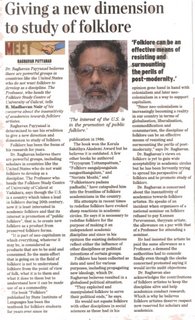
The following is an item appeared in The Hindu dated 9 July 2006.
to study of folklore
Dr. Raghavan Payyanad believes there are powerful groups in countries like the United States who do not want folklore to, develop as a discipline. The Professor, who heads the Folklore Study Centre of
Raghavan Payyanad is determined to use his erudition to give a new direction and dimension to study of folklore. Folklore has been the focus of his research for years. Dr. Raghavan believes there are powerful groups, including scholars in countries like the
"It is part of neo-capitalism in which everything, whatever it may be, is considered as products that are to be sold and consumed- So the main effort that is going on in the field of folklore is not to understand folklore from the point of view of folk, what it is to them and what it does to them but to understand how it can be made use of as a commodity. His book "Folklore" published by State Institute of Languages has been the textbook for folklore students for years ever since its 'The interest of the
He would not equate folklore with other disciplines in social sciences as these had in his 'Folklore can be an effective means of resisting and surmounting the perils of post-modernity/opinion gone hand in hand with colonialism and later neo- colonialism in a way to support capitalism. "Since neo-colonialism is increasingly becoming a reality in our country in terms of globalisation, liberalisation, commodification and consumerism, the discipline of folklore can be an effective means of resisting and surmounting the perils of post-modernity," says Dr. Raghavan.
Dr. Raghavan's views on folklore is yet to gain wide acceptability in academic circles but he has been fervently trying to spread his perspective of folklore and to promote study of folklore. Dr. Raghavan is concerned about the insensitivity of academics towards folklore artistes. He speaks of an incident when organisers of a national seminar on folklore refused to pay Kannan Peruvannan, theyyam artiste, the allowance on a par with that of a Professor for attending a seminar.
He had insisted the artiste be paid the same allowance as a Professor, a demand the authorities had to concede finally even though the clerks concerned protested saying it would invite audit objections.
Dr. Raghavan also acknowledges the contributions of folklore artistes to keep the discipline alive and help academics conduct research. Which is why he believes folklore artistes deserve respect now reserved for scholars and academics.
1 comment:
It is very interesting to note that Professor Raghavan Payyanad Folklore Department at Calicut University and his salary is entirely funded by the Ford Foundation, one of the United States biggest and wealthiest cultural companies. The Ford Foundation has a long history of cultural imperialism. Professor Raghavan Payyanad does not seem to have any problem accepting money from this right-wing institution. Very interesting, no?
Post a Comment